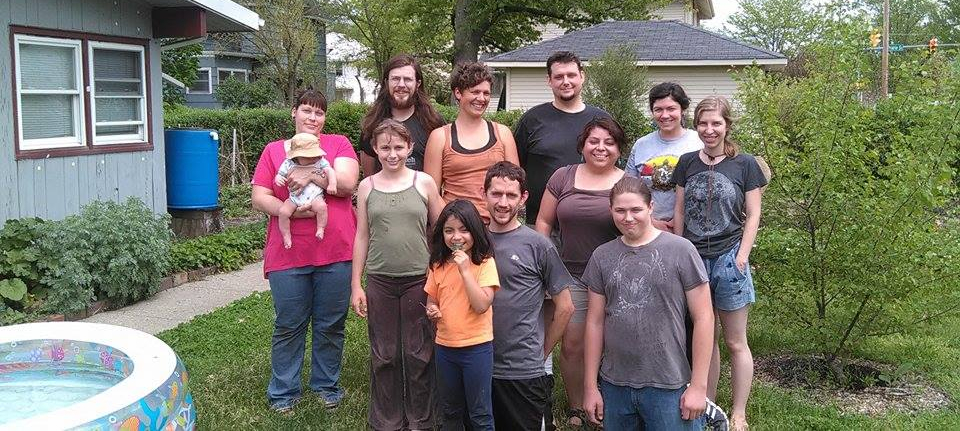
Jason is a leader in the People’s History of Elkhart organization and a member of the Prairie Wolf Collective in Elkhart, Indiana, as well as being active in the effort to build a new Poor People’s Campaign for today.
Just over five years ago, I was sitting anxiously at a county tax sale auction—going up against a room full of people in an attempt to buy a home for a group of us who had pooled together our money. We had researched, settling on three abandoned houses in the neighborhood where the seven of us are renting, and where we would like to put down roots.
As the first home comes up, I bid for our group—but the bids rise quickly out of our range. The first house goes to a speculator from Dallas. Our luck is better with the next two houses, and we win both bids—eventually coming away with both—and for less than $10,000 total!
In the years that follow, the two adjoining properties become what is now the Prairie Wolf Collective — since one faces Prairie Street and the other Wolf Avenue. We watch the nearby house that the speculator won as he leaves it vacant and the grass unmowed for two years and then sells it at a profit.
We also attempt to share our experience with other neighbors— helping a few keep from losing their homes to the tax sale in the first place, and supporting over a dozen people in buying formerly abandoned homes to repair and live in.
[aesop_image img=”https://kairoscenter.org/wp-content/uploads/2015/06/lois-and-lupita.jpg” alt=”Finding home” align=”center” lightbox=”off” caption=”Lois and Lupita at community work day for an abandoned house bought at a county tax sale.” captionposition=”left”]
But even more frequent than these successes are those who can not save their home and have to move out, as well as friends and neighbors who get outbid by the investors who dominate these tax sales. These speculators buy dozens of houses at a time with amounts of money we can barely comprehend, much less match.
Often the day-to-day work of the Prairie Wolf Collective deals with permits and group decision-making, renovations, and finances. However, looking back at the bigger picture, I realize that the experience we have had in creating this project arises from challenges shared by many people around my age.
According to a 2014 Pew Research study on the United States, my generation, the 18-to-34 year olds known as Millennials “have the unhappy distinction of being the first generation in modern history to have a lower standard of living than their parents’ generation had at the same stage of the life cycle. Despite collecting more college diplomas than any generation in history, Millennials lag behind their same-aged counterparts of yesteryear on virtually all key indicators of economic well-being—including employment, income, wealth, debt, and poverty.”
And while the particulars might be new in the extent to which a whole generation is feeling the brunt, poor and working people of all ages have been facing similar conditions for a long time:
- Trying to meet our basic need for housing without adding too much to the debt that we already have—in the case of Prairie Wolf members, from higher education and car loans
- Coming up against forces—like the speculators at tax sales—that prioritize profit over these basic needs
- Finding limited success through shared action, but feeling painfully aware that even these important victories are not changing the overall trajectory.
In the 1967, Rev. Dr. Martin Luther King, Jr. spoke powerfully about these themes in his historic “Beyond Vietnam” speech, declaring that “A true revolution of values will soon look uneasily on the glaring contrast of poverty and wealth.”
As this disparity between wealth and poverty continues to widen, many of us—perhaps most notably from among young people—will stand with the poor and dispossessed not only because of our values, but increasingly because our basic material needs require us to do so.